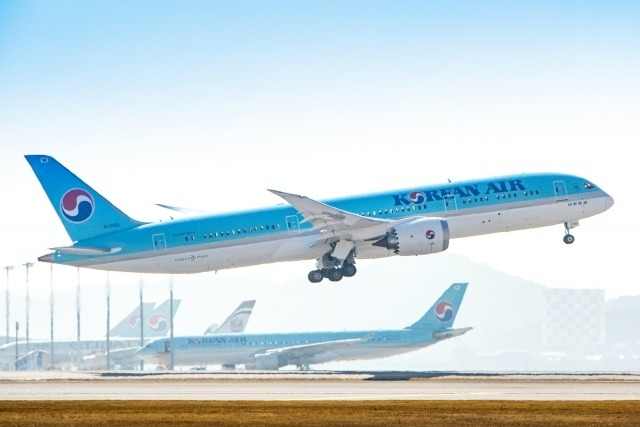Airlines
Korean Air to use bio-jet fuel on international flights
The airline signs MOU with GS Caltex to demonstrate bio-jet fuel project for low carbon emission
By Jun 29, 2023 (Gmt+09:00)
2
Min read
Most Read
LG Chem to sell water filter business to Glenwood PE for $692 million


Kyobo Life poised to buy Japan’s SBI Group-owned savings bank


KT&G eyes overseas M&A after rejecting activist fund's offer


StockX in merger talks with Naver’s online reseller Kream


Mirae Asset to be named Korea Post’s core real estate fund operator



Korean Air Lines Co. announced on Thursday that it will start operating bio-jet fuel flights in partnership with GS Caltex Corp., marking the first domestic demonstration operation of its kind in South Korea.
Korean Air signed a memorandum of understanding with GS Caltex on Thursday for the purpose of conducting demo flights using bio-jet fuel.
This agreement is part of the roadmap for expanding the supply of environmentally friendly bio-fuels announced by tSouth Korean government in October last year.
Korean Air plans to receive bio-jet fuel through GS Caltex for use in international flights departing from Incheon. The product has been confirmed to meet international quality standards set by ASTM International and others.
The demo flights will take place for a period of six months starting in the second half of this year. The government plans to establish standards for the introduction of bio-jet fuel for domestic use based on the results. These standards will serve as a reference for establishing quality standards before full-scale domestic production.
Bio-jet fuel, also known as sustainable aviation fuel (SAF), is expected to play a crucial role in reducing greenhouse gas emissions from aviation operations. It is produced from environmentally friendly sources such as animal and plant oils, algae and urban waste gases, rather than conventional fossil fuels like petroleum or coal. Compared to conventional aviation fuel, it can reduce carbon emissions by up to 80%.
Major countries have been increasing the use of bio-jet fuel. The European Union has mandated that bio-jet fuel must be blended at a minimum of 2% for all aircraft refueling at their own countries' airports starting from 2025.
Several countries, including the US, have introduced various policy support measures such as tax incentives to promote the expansion of bio-jet fuel supply. The International Civil Aviation Organization (ICAO) has set a target of achieving carbon-neutral emissions by reducing greenhouse gas emissions from aircraft to zero by 2050.
Korean Air became the first domestic airline in 2017 to operate a flight using bio-jet fuel on the Chicago-Incheon route. In recent years, it has made efforts to expand the market by introducing bio-jet fuel on regular routes such as the Paris-Incheon route.
Write to Mi-Sun Kang at misunny@hankyung.com
More to Read
-
 Aerospace & DefenseKorean Air delivers AH-6 helicopter fuselage to Boeing
Aerospace & DefenseKorean Air delivers AH-6 helicopter fuselage to BoeingJun 26, 2023 (Gmt+09:00)
1 Min read -
 AirlinesKorean Air says it can conclude Asiana takeover via big concessions
AirlinesKorean Air says it can conclude Asiana takeover via big concessionsJun 07, 2023 (Gmt+09:00)
1 Min read -
 AirlinesUS antitrust body blocks $1.4 bn Korean Air-Asiana deal
AirlinesUS antitrust body blocks $1.4 bn Korean Air-Asiana dealMay 22, 2023 (Gmt+09:00)
4 Min read -

-
 AirlinesKorean Air to launch in-flight wi-fi service for int'l routes
AirlinesKorean Air to launch in-flight wi-fi service for int'l routesMay 09, 2023 (Gmt+09:00)
1 Min read
Comment 0
LOG IN


